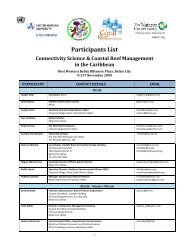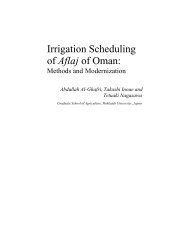The Global Water Crisis: Addressing an Urgent Security - Unu-inweh ...
The Global Water Crisis: Addressing an Urgent Security - Unu-inweh ...
The Global Water Crisis: Addressing an Urgent Security - Unu-inweh ...
You also want an ePaper? Increase the reach of your titles
YUMPU automatically turns print PDFs into web optimized ePapers that Google loves.
2.4. <strong>Water</strong>, conflicts, <strong>an</strong>d institutions<br />
In their 2009 report on Climate Ch<strong>an</strong>ge <strong>an</strong>d <strong>Security</strong> in Africa, Brown <strong>an</strong>d Crawford (2009: 6) summarized their review of<br />
emerging policy reports on the security implications of climate ch<strong>an</strong>ge by emphasising that “[l]ike much research about<br />
the links between environmental ch<strong>an</strong>ge <strong>an</strong>d security, the literature on climate ch<strong>an</strong>ge <strong>an</strong>d conflict tends to focus on<br />
the structural conditions in which conflict emerges, such as scarcity of a resource, rather th<strong>an</strong> the role of individuals <strong>an</strong>d<br />
institutions in initiating, sustaining, resisting or resolving conflict”. <strong>The</strong>y conclude that according to Barnett <strong>an</strong>d Adger<br />
(2007), “it [that is, the research] tends to downplay the short-term causes (or triggers) of conflict <strong>an</strong>d the import<strong>an</strong>ce of<br />
hum<strong>an</strong> decisions – the choices made by individual ‘actors’ in a conflict” (Brown <strong>an</strong>d Crawford, 2009: 6).<br />
Thus, at a fundamental level, conflict originates from the interaction between individuals <strong>an</strong>d moves towards their<br />
surrounding environment in general. “Conflict is therefore mostly rooted in the ‘micro’ level. <strong>The</strong> way these conflicts<br />
evolve depends highly on the availability <strong>an</strong>d the functioning of local level institutions or mech<strong>an</strong>isms” (Bildhäuser, 2010:<br />
2). Likewise, the effects of climate ch<strong>an</strong>ge <strong>an</strong>d water hazards will principally be felt locally by individuals, families, villages,<br />
<strong>an</strong>d neighbourhoods. <strong>The</strong> diversity of climate ch<strong>an</strong>ge <strong>an</strong>d hazards effects <strong>an</strong>d of how individuals, households, villages,<br />
governments, <strong>an</strong>d civil society deal with them are best understood through <strong>an</strong> <strong>an</strong>alysis of their local circumst<strong>an</strong>ces. Crucial<br />
in that regard is the adaptive capacity of people <strong>an</strong>d communities, mediated through institutions. Adaptation to climate<br />
ch<strong>an</strong>ge <strong>an</strong>d water hazards c<strong>an</strong>not be effective without robust institutions.<br />
Having said this, it is obvious that the underst<strong>an</strong>ding of climate ch<strong>an</strong>ge as a threat multiplier at the same time implies that<br />
strong <strong>an</strong>d effective institutions <strong>an</strong>d conflict prevention measures could function as threat minimisers. As emphasized by<br />
Scheffr<strong>an</strong> <strong>an</strong>d Battaglini (2011: 30), the marginal impact of climate ch<strong>an</strong>ge c<strong>an</strong> make a big difference, particularly in less<br />
wealthy regions <strong>an</strong>d in societies on the edge of instability: “[b]y triggering a cycle of environmental degradation, economic<br />
decline, social unrest <strong>an</strong>d political instability, climate ch<strong>an</strong>ge may become a crucial issue in security <strong>an</strong>d conflict”, particularly<br />
by overburdening states <strong>an</strong>d regions which are already conflict prone <strong>an</strong>d/or affected by fragile statehood <strong>an</strong>d which are<br />
characterized by <strong>an</strong> overlapping of diverse <strong>an</strong>d competing logics of political <strong>an</strong>d social order <strong>an</strong>d behaviour (Europe<strong>an</strong><br />
Commission, 2008; Boege, 2009). A spillover of state weakness-induced security risks (e.g. social unrest, refugee flows,<br />
separation movements, warlordism) c<strong>an</strong> contribute to destabilization processes, which could, according to WBGU, lead to<br />
the geographical exp<strong>an</strong>sion of a local crisis <strong>an</strong>d to <strong>an</strong> overstretching of global <strong>an</strong>d regional govern<strong>an</strong>ce structures (WBGU,<br />
2007b). Brown <strong>an</strong>d Crawford (2009: 2) rightly state that “it is non-climate factors (such as poverty, govern<strong>an</strong>ce, conflict<br />
m<strong>an</strong>agement, regional diplomacy <strong>an</strong>d so on) that will largely determine whether <strong>an</strong>d how climate ch<strong>an</strong>ge moves from<br />
being a development challenge to presenting a security threat”. Climate ch<strong>an</strong>ge or disaster triggered socio-economic <strong>an</strong>d<br />
political stress might therefore “erode the functioning of communities, the effectiveness of institutions <strong>an</strong>d the stability<br />
of societal structures” as indicated by Scheffr<strong>an</strong> <strong>an</strong>d Battaglini (2011: 29).<br />
Hence, robust <strong>an</strong>d sophisticated institutions at all administrative levels seem to be key to mitigating the aforementioned<br />
risks of <strong>an</strong> increase in climate-induced water conflicts. Although Tir <strong>an</strong>d Stinnet (2012), who undertook <strong>an</strong> in-depth <strong>an</strong>alysis<br />
of 315 river cooperation agreements signed between 1950 <strong>an</strong>d 2002, found evidence for a higher risk of militarized<br />
conflicts under conditions of water scarcity, they could show on the other h<strong>an</strong>d that “the more institutionalized the river<br />
treaty, the lower the likelihood of militarized conflict between the river treaty signatory states” (Tir <strong>an</strong>d Stinnet, 2012:<br />
220). <strong>The</strong>y conclude that “[h]ighly institutionalized river treaties […] provide mech<strong>an</strong>isms for m<strong>an</strong>aging disputes before<br />
they escalate” <strong>an</strong>d “that international institutions could be useful tools for some of the predicted consequences of<br />
climate ch<strong>an</strong>ge, such as water scarcity <strong>an</strong>d ch<strong>an</strong>ges in the seasonal flow patterns of rivers“ (Tir <strong>an</strong>d Stinnet, 2012: 223).<br />
This serves as <strong>an</strong> excellent example of the necessity, but also of the functioning, of robust institutions at the government<br />
<strong>an</strong>d international, or rather the ‘macro’, level.<br />
<strong>The</strong> same applies to the local or ‘micro’ level. Recent research results from Ad<strong>an</strong>o et al. (2012) <strong>an</strong>d from <strong>The</strong>issen (2012)<br />
showed that the likelihood for violent conflicts at the local level is higher in wetter seasons th<strong>an</strong> in dry seasons, corroborating<br />
the academic discourse about the import<strong>an</strong>ce of local, often traditional institutions or regimes for conflict resolution <strong>an</strong>d<br />
natural resources m<strong>an</strong>agement (see Kramm <strong>an</strong>d Wirkus, 2010; Boege, 2009 <strong>an</strong>d 2006; Swatuk <strong>an</strong>d Wirkus, 2009). <strong>The</strong>y do<br />
so by pointing to the role of socially-embedded institutions <strong>an</strong>d customary rules, which especially facilitate the survival<br />
of families, cl<strong>an</strong>s, villages <strong>an</strong>d tribes in rural areas by m<strong>an</strong>aging access to natural resources <strong>an</strong>d l<strong>an</strong>d, especially during<br />
drought periods or in water-scarce regions, <strong>an</strong>d by mediating conflictive situations through traditionally accepted me<strong>an</strong>s<br />
(see Kramm <strong>an</strong>d Wirkus, 2010; Boege 2009; Swatuk <strong>an</strong>d Wirkus, 2009).<br />
<strong>Water</strong>, Climate Ch<strong>an</strong>ge <strong>an</strong>d Hum<strong>an</strong> <strong>Security</strong>: Conflict <strong>an</strong>d Migration<br />
Part 1<br />
39




